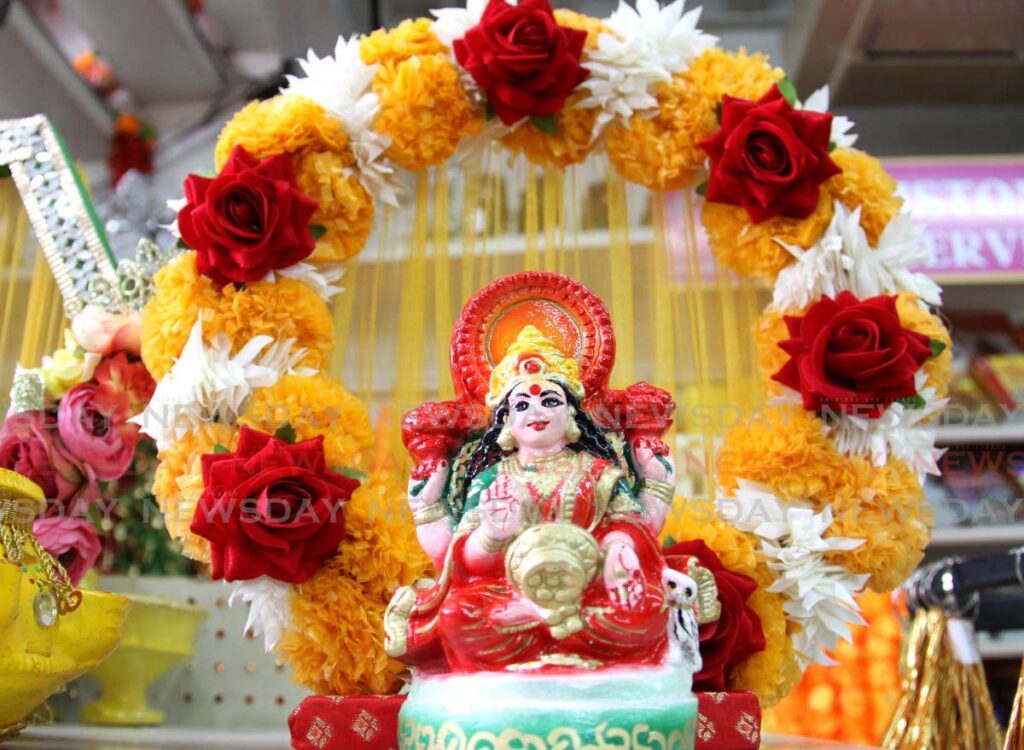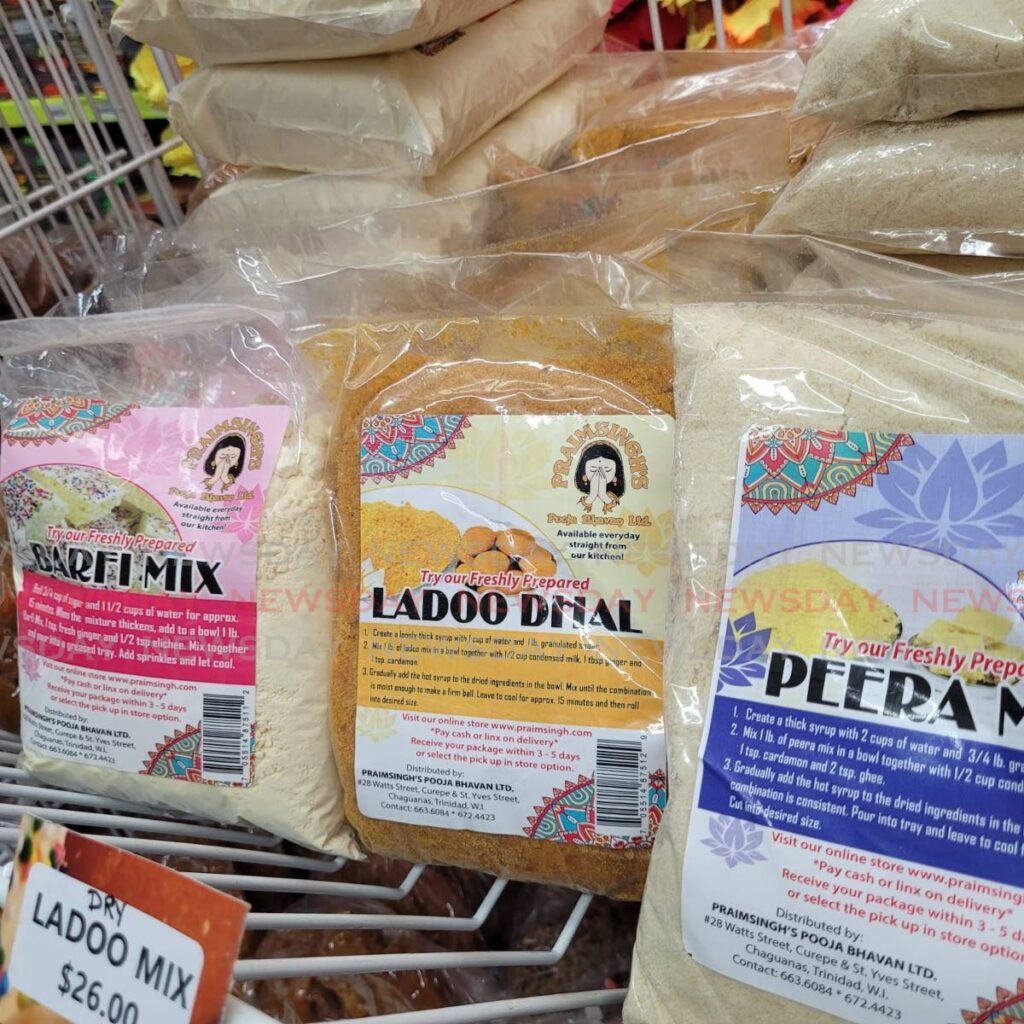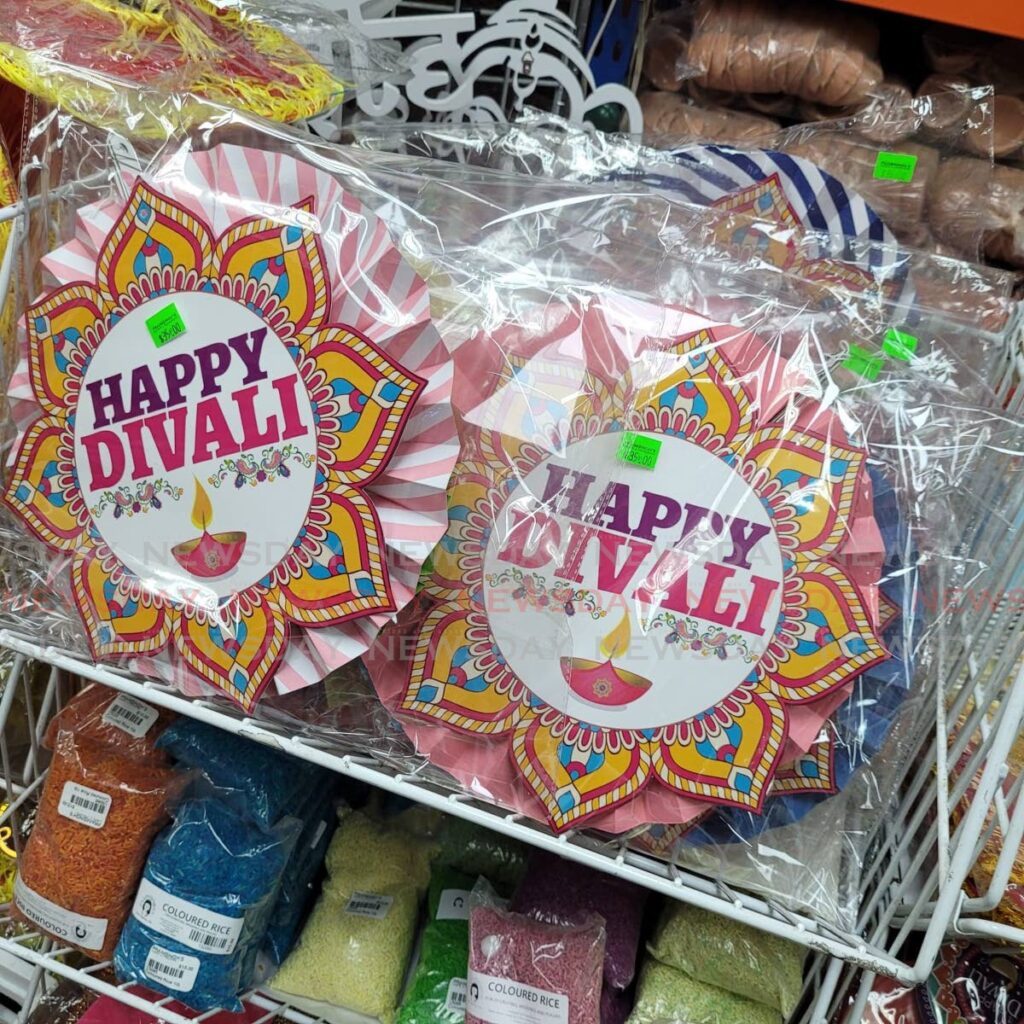The Litte Store, Praimsingh's: More than a pooja store

FOR many, stores such as The Little Store and Praimsingh's, both located on Rapsey Street in Curepe, are one-stop shops with everything one would need to celebrate holidays such as Divali. However, these stores are more than pooja outlets, but have been hubs for religious and spiritual observations, as well as centres for culture and cuisine.
With businesses that span multiple generations both the Little Store and Praimsingh's have built legacies out of their devotion to religion, culture and customer service.
Now, with a new generation of leaders at the helm both stores are, in different ways, looking to the future while holding firm to the standards and morals established in the past.
Legacy
The Little Store and Praimsingh's both have rich histories, having grown out of the early businesses and developments in Curepe.
Babu Praimsingh (1890-1956) founded Praimsingh's in the 1940s when he left his home in Bihar, India and came to TT after spending years travelling back and forth from places such as Natal (a city in east Brazil), South Africa, Guyana, Suriname and Venezuela. He married and settled in Tacarigua before moving to Curepe, establishing Praimsingh's as one of the nation’s first pooja store.
Back then the store started as a popular shop, selling local home-made snacks. As he got older, his thirst for knowledge grew. He took several trips to India and he began sharing his Hindu faith through his shop, selling religious books and pictures. As popularity among pundits, intellectuals and people in the neighbourhood grew Praimsingh’s expanded its inventory with brass items, pooja materials and other East Indian goods.
The love for East Indian culture and spirituality was carried on through generations to Ajeet Praimsingh who took over the business in 1979 from his mother Popo “Iron Lady” Praimsingh, Babu’s daughter-in-law.

Ajeet, who grew up following his parents and grandparents’ business acumen and spirituality, started setting trends through his love for indigenous culture. He prepared handouts for every religious occasion for free to customers, and implemented a religious seasonal section where he displayed books, murties, and materials for each season.
Throughout his life and through the business, Ajeet championed spirituality and culture through the business. The Praimsingh's record label introduced several major East Indian artistes to TT. He was also the founder of the Mere Desh Committee as a means to educate communities on East Indian achievements.
Ajeet himself was the recipient of many awards for his own achievements in promoting East Indian culture. His awards included the national Humming Bird (silver) medal, the Chaguanas Borough Corporation Mayor’s award and the National Chutney Foundation and National Cultural Promotion award.
Similarly, the Little Store came from humble beginnings. Founded 65 years ago by Sankar Ramnarine, who passed away in January, and Dularie Sankar, the Little Store started as a haberdashery.
“My grandfather was a tailor,” said third generation business owner, Vinayak Sankar. “When his wife entered the business she broadened his perspective because people came to ask for certain things.”
While the Little Store itself grew as a niche retail store and haberdashery, promoting spirituality through the sale of spiritual goods, nick-knacks, books, decorations and other items, it has also created a spice company which sells West Indian spices under the Chatak brand. The company has since expanded to be able to export East Indian delicacies such as khurma, barfi, East Indian and West Indian food products through the Caribbean and the eastern coast of the United States.

The next generation
With the next generation of owners came new strategies that may not have been thought of by those before, such as utilising digital technology to take both businesses forward.
The fourth generation of leaders at Praimsingh's are the daughters of Ajeet Praimsingh – Chandevi, Sangeeta and Kavita.
The Little Store is now led by the Sankar Ramnarine's grandchildren – Vinayak and Siddhi.
Vinayak told Business Day that he uses social media to expand the reach of the business.
“Don’t discount social media,” he said. “That is where you get the most bang for your buck in business.”
He said since he took the helm of the business with his sister he made it a personal mission to expand the business' online presence himself.
“This store is so particular that not just anyone can come here and say they know what to market and how to market it,” he said. “Nowhere else in the world will you be packing deyas on a shelf and catering to pack it a certain way so it would not fall. The same thing goes for social media and online presence. You have to be familiar with the store and the products to know what to market, how to market it and who is the target audience.”
He added that the business also used advertising through multimedia sources for outreach.
Their Chatak brand of khurma was advertised during CPL, and Vinayak said that has resulted in tremendous feedback.

“Our khurma is all the craze now,” he said.
Chandevi said Praimsingh's is also looking at digital means to expand. She told Business Day they launched its website, www.praimsingh.com, in 2020. It was the first pooja store to have an online interface, she claims.
“From the first pooja store to the first online pooja store – much innovation has taken place between then and now,” Chandevi said. “During the lockdown period the store was also the first to launch a series of pooja tutorials for easy at-home worship guidance on its You Tube page Praimsingh Culture Hub. This allowed for Hindus worldwide to perform their pooja with a virtual pundit at their fingertips.”
Vinayak added that with the growth of the business, he and his sister have begun to put in place an organisational structure, with a board of directors, and key positions being held by family members to start.
“All credit goes to my parents and my grandparents for allowing us to take this step and take the company to the next level,” he said. “All of the nitty-gritty details that my parents stressed on, it is nice to see now that we could bring some method to the business, and that comes with organisational structure.”
He said the structure goes from board members, who are family, to general managers, floor managers and then kitchen assistants, all the way down to the retail service level.
“By putting this in place we actually set ourselves toward the future when we are ready to expand and move out of TT because that is one of our goals.
New world, new challenges, core values
As the world changes, both families told Business Day they are hoping to hold firm to the core values of their businesses while remaining flexible to deal with the challenges of today.
“I think there is a strength in a family business that no other business can champion,” said Siddhi. “That is because you have been cultured to the situation, to the family values and what the business represents.”
Vinayak and Siddhi spoke about their experiences growing up around a pooja store and said the values they learnt are now being passed on to their children.
“My children are in the rush of everything,” Siddhi said. “They are learning how to pack shelves and how to service a customer.”

Service is one of the core values of both stores. Chandevi said for stores like Praimsingh's human interaction is key.
“I think that is what our store provides most of all,” she said. “The energy and environment is important for a customer. It definitely needs to be accommodating and the sales clerks need to have that level of openness when they are interacting with customers.”
“There are customers who are very conscious about where their items come from – whether it is stored in an environment with meat or alcohol or where it is made. If a customer resonates with your space and service, it is because you somehow align with their personal value system.
"I think because our store is so service-orientated, the experience itself is different compared to other stores. There are customers who know what they want, but there are other customers who are really looking for that human interaction.
The Sankar family also shares their devotion to spirituality, family and service with their staff.
Vinayak told Business Day that even employees are becoming more enlightened with the access to religious and educational books that are available at the store.
These core values were vital when navigating the recent global shocks such as covid19 and the Russian/Ukraine war. Both families said their businesses were not exempt from the negative impact of these global shocks, as well as challenges such as limited access to foreign exchange (forex).
“We get our items from local and international supply chains,” Chandevi said. “Yes, forex is constantly affecting our trade but it is important to stay creative. Being solution-oriented in creative ways help us to identify local business opportunities for items that we cannot source internationally.”
Vinayak said the company went through a mindset change during covid19 that helped them expand even coming out of the pandemic.
“We realised that everyone doesn’t really need to come to the store to shop,” he said. “People can shop from home. It is about creating the level of convenience for people and ensuring to grab the market in particular ways.”

He said about 35 per cent of sales come from online marketing. He added that most of its events are also recorded and posted on social media to maintain The Little Store’s presence.
Both families said the communities they serve and their core goals of promoting culture and religion are most important to them. Chandevi said their intention is to keep culture alive through competition and incentives for youth.
Vinayak said as the next generation to take the business forward they have big shoes to fill, but are ensuring it maintains the spirit that was cultivated by its founders.
“Here at the Little Store everyone must feel welcome. This is not just a pooja store but a store where anyone can find something, even if its our sweets, we have something that will give you a taste of TT culture. That is something that we are proud of, and something we would like to maintain.”

Comments
"The Litte Store, Praimsingh’s: More than a pooja store"